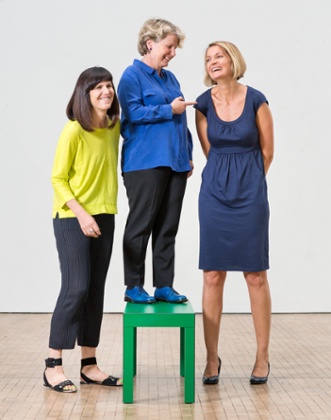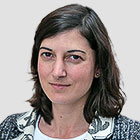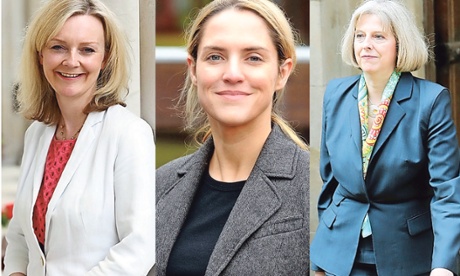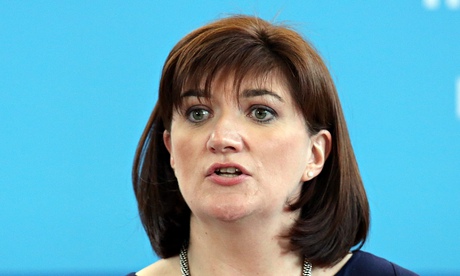They arrive in a bustle with a crackle of paper bags and soon the meeting room table is festooned with salad boxes and plastic cutlery. Sandi Toksvig is mum, unpacking, handing everything out. “Crayfish!” she calls. That’s for the party leader, Sophie Walker. There is mezze with pomegranate for Catherine Mayer, Toksvig’s co-founder of the party. Off come the jackets. Drinks are passed around. They have even, kindly, bought cake. It is all incredibly convivial. Definitely a party, if not immediately obviously a political one.
This sort of conviviality has played a big part in the foundation of the Women’s Equality party, or WE. They chose the acronym because it suggests collaboration. “We are WE,” says Mayer. “But a lot of people insist on WEPping us.” It sprung out of a small group that soon became a larger group of like-minded women, gathering in each other’s homes and in bars, and as Mayer, Toksvig and Walker run through the tale of how it came into being, their story skirts many laden tables.

“We had these wonderful, robust meetings,” says Toksvig. “Kitchens and sitting rooms. With herring. There was a lot of herring. I’m herring supplier.”
“Herring and cake,” clarifies Mayer who, in many ways, is the organisation’s memory and linchpin: her membership card bears the number 000001. It was Mayer who first announced the idea for a standalone party at an event at the Women of the World festival in London in March, slightly scooping her friend Toksvig, who had already booked the celebrity members of a fantasy cabinet for later in the same festival.
“I said to Catherine, ‘Well, it’s a wonderful idea, but I’m already doing it!’” Toksvig chimes in.
Did she mind?
“Not in the slightest. Much better to work together. I don’t care whose idea it was. I care that it was in the air and it needed doing, so we sat down together and said, ‘Well, let’s do it.’”
That was over a beer, Mayer adds. Her interceptions are like little footnotes, straightening the record. And that beer evokes another table, more refreshment: maybe they positively want to cultivate an atmosphere of clubby inclusivity.
Back then, of course, the general election was still two months away. Mayer was at the festival’s Women in Politics event, debating ways to bring about gender equality. “The Queen Elizabeth hall. Completely full. Instead of there being excitement, there was a sense of depression. And the only thing anybody could think to do was to set up one of those Downing Street petitions,” she says with a little laugh.
“So I stood up and said that what was needed was a party that would focus on gender equality. Because Ukip had shown that by being an electoral force, you galvanised the big parties into thinking, ‘Maybe we should focus on those policies.’”
So here they are, nearly six months on, possibly on the brink of changing the political landscape. There is no arguing with their purpose, or the need for a correction to the mainstream: look no further than Labour’s struggle to elect a female leader. But, still, they make an intriguing threesome.
Mayer, author of a biography of Prince Charles and a journalist, is the most obvious politician of the three – the entire time she talks, she balances a small smile on her lips. Her sentences knit together smoothly. She has a sharp look, but that may be due to the asymmetric fringe and black nail polish.
Toksvig is the entertainer and general goodwill ambassador – she is about to go on a nationwide fundraising tour. She leans back, arms crossed, blue-rimmed glasses nestling in thick blonde waves on top of her head, every now and then interjecting with a quip and a delighted kick of her blue, brogued feet.
Then there is Walker, the leader, at least until the membership elects someone next year. But Walker is pretty quiet. Between Mayer and Toksvig – neither of whom wanted the job, as they found over another beer – it is tricky to squeeze in a word. How did she end up as leader? Did they give her a grilling?
“Oh, that’s us, right!” says Toksvig.
“There was a series of conversations,” says Walker finally. At the end of each meeting, or stream of “reply-all emails”, she was “the person saying, ‘Right, how are we going to put some structure around this?’” She was the steering committee’s unanimous choice.
A reporter and editor for the Reuters news agency for more than a decade, Walker has also blogged about her experiences as the mother of a daughter with Asperger’s syndrome. The blog led to a book, Grace Under Pressure, and an advocacy role at the National Autistic Society. She has no obvious political experience, though her husband, Chris Naylor, is the chief executive officer of Barking and Dagenham council. And now here she is, the full-time, fully paid leader of a new political party. Well, presumably she is full-time and paid.
“What’s the date?” she says.
“You’re not yet, are you? Or maybe you are,” says Mayer, who has a habit of swallowing other people’s interjections into a parenthesis in her own speech.
“Is it as of today?” Walker asks.
Holly, helping out for the day in the capacity of PR, looks up. “It’s the 25th.”
“Yes! Oh, yes. As of today I am!” says Walker. Toksvig lifts her bottle. “Hey, well done! Thank God we had fizzy water.”
There is a scattiness about the way the three of them reach their conclusions that blurs into an impression, if not of disorganisation, then at least of an organisation that is still waiting to get to know itself. This appears to be the plan. For example, the party has six core objectives that cover violence against women, health, education, women in media and in their working and home lives. It would be good to define those objectives by finding out where the party stands on a number of recent issues. But pressed on a few, they are resolute that they won’t be taking a line until their working groups report back, which won’t be until October. Outside of their six goals, members will be free to express any views they like.
“Help yourself,” says Toksvig. “It’s a new way of doing politics,” she adds. “It’s a new line that we’re treading, and we want as far as we can, to try and get it right.” They confirm that they would stand male candidates at the next general election – “Well, why not, if they sign up to the objectives?” asks Toksvig – and they would have no qualms standing against female MPs who had failed to sign up.
The idea is that the vast disenchanted – more than 15 million abstained from voting on 7 May – has tired of oppositional politics and would happily tolerate disparate voices from the same party for the sake of a more honest and open discussion. After all, underpinning it would be a heartfelt subscription to those core objectives, which cross the interests of all the mainstream parties.
On Walker’s recent tour of party branches in Sheffield, Edinburgh, Glasgow, Chesterfield, Leeds and Brighton, it was the “nonpartisan working together ... that got the biggest cheer”, she says. Spreading interest and responsibility across the political spectrum also helps prevent the ghettoisation of women’s issues. “They’re ghettoised at the moment,” says Walker. “You’ve only got to look at the Barbie bus if you want ghettoisation,” adds Toksvig.
To that end, WE members – who number in the “thousands” (more precise data is still being collected, although 1,400 people joined the day that membership opened) – are permitted to belong to other political parties, too. They currently range from age 14 to beyond 90, and include “hundreds” of men. But the three faces around the table – white, middle-aged, middle-class (they nod at this one), all with successful media careers behind them – do not suggest diversity.
Walker puts on a scary voice: “The curse of the white middle-class women … Terrible, isn’t it! They get everywhere! God forbid, that she should be in charge.” She claims that diversity is happening “organically” in some of the branches. “If you look, for example, at our Cardiff branch, it includes a Kenyan woman.”
Toksvig later refers to this person as “the wonderful woman from the Cardiff branch”: The woman “knows what she is talking about, the difficulties of political engagement for the BAME community,” Toksvig says, “and so we’re listening. There’s no other way of doing it. We can’t change who we are, or indeed need to excuse it.”
She is right that listening is a start. But listening to Toksvig, Mayer and Walker, clues arise that suggest they may not be able to hear how their assumptions can shade into complacency. After the party launched in spring, thousands of emails began to arrive, and they worked through the night to reply to them. “In pyjamas. All in our bedrooms and our studies,” Walker says, apparently oblivious to the idea that for most of the population, a study indicates a house with more rooms than people who need beds. Their language is encoded with a privilege they appear not to notice. Along with the origins on the South Bank, the merriment at the fact that funds are so tight, Walker often has to take the bus … It all suggests difference of the wrong kind: that the life experiences of Mayer, Toksvig and Walker may be alienatingly divergent from the people they want to reach.
When their whole pitch is about a political elite that fails to represent the country, you might expect them to be more alive to the problem. Then again, David Cameron and George Osborne (and Andy Burnham and Tim Farron) probably have studies, and certainly aren’t often found on a bus, and don’t seem to notice the problem at all. At least WE are addressing one aspect of it.
They insist that their outlook is broader than it might seem. A spokesperson says that the steering committee is “made up of women and men who are BAME, LGBT, disabled, working class and more”. It would be interesting to see the proportionality of representation, but WE won’t share their names. Perhaps some of them are in this picture.
“Intersectionality,” says Toksvig, “is a word that had never occurred to me before, dear God” – though Kimberlé Crenshaw coined it more than 20 years ago. Walker adds: “We’re not asking about it, people are telling us. We’re listening to them.”
Where, in any case, is all this leading? Where, in particular, would they like to be in 2020, supposing there is another general election? For the first time, the room falls quiet. By now, everyone has finished eating. The seconds lengthen. Perhaps they are all busy consulting their hopes.
It is Walker who breaks the silence. “Ideally, a good result in 2020 would be for the party to disband. Job done. That’s what I’d really like.”
“That would be great,” says Toksvig, sounding relieved. “Every single party takes on board the six core aims. Everybody agrees to it and we get the job done.”
“So, the equal pay legislation works, there’s no violence against women, I feel like my daughters are being heard and the jobs they do are being remunerated at the same rate,” Walker says, “seriously, the ultimate aim of the party is not to have to do this job.”
Suddenly, just as they contemplate victory, they sound downbeat, as if they have stared at 2020 and just can’t see it happening. Of course, they know it will take more than five years, but Toksvig believes they can do it partly because the transformation in her “personal position as a gay woman in 20 years has been astonishing”. If they can make some changes closer to home, perhaps her convictions and good faith will give her – and her party – a chance to make a difference. “Because of my fighting for LGBT rights, I have seen the possibility of change,” she says. And that gives me heart to believe that it is possible to effect change.”











